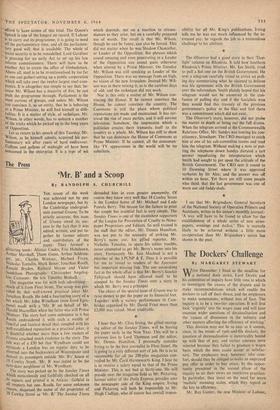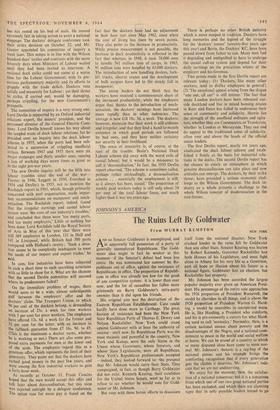The Dockers' Challenge
By MARGARET STEWART
WITH December 1 fixed as the deadline for a national dock strike, Lord Devlin and his committee of inquiry have little time in which to investigate the causes of the dispute and to make recommendations which will enable the dockers to call off their threat, and the employers to make concessions, without loss of face. The inquiry is to be a two-tier operation. It will first look 'urgently' into the wages issue and will later examine wider questions of decasualisation and the 'causes of dissension in the industry and other matters affecting the efficiency of working.'
This division may not be so easy as it sounds, since, in the minds of rank-and-file dockers, the question of decasualisation is inextricably bound up with that of pay, and earlier schemes were rejected because they failed to produce a wages basis which the men could accept as satisfac- tory. The employers may, however; take com- fort, should they be obliged to make an improved pay offer in order to buy peace, by the oppor- tunity presented in the second phase of the inquiry to air their views on restrictive practices. In particular, they insist on the need for more 'realistic' manning scales, which they regard as the key to efficiency.
Mr. Ray Gunter, the new Minister of Labour, has not rested on his bed of nails. He moved extremely fast in taking action to avert a national stoppage. The dockers' delegate conference took their strike decision on October 22, and Mr. Gunter appointed his committee of inquiry a week later. This tempo is in line with the Wilson hundred days' tactics and contrasts with the more leisurely days when Ministers of Labour waited until they had been invited to intervene. A national dock strike could not come at a worse time for the Labour Government, with its pre- carious parliamentary majority and its efforts to grapple with the trade deficit. Dockers vote solidly and massively for Labour: yet their threat to strike, if carried out, would be damaging, Perhaps crippling, for the new Government's Prospects.
The committee of inquiry is a very strong one. Lord Devlin is supported by an Oxford industrial relations expert, the miners' president, and the personnel director of the General Electric Com- Pany. Lord Devlin himself knows his way about the tangled maze of dock labour relations, for he Presided over an inquiry into the dock labour scheme in 1955, when the ports had been sub- jected to a succession of crippling unofficial strikes. Between 1947 and 1955 there were six major stoppages and thirty smaller ones, causing a loss of working days seven• times as great as in the eight pre-war years.
The new Devlin inquiry will be the fifth into labour troubles since the end of the war— Forster in 1946, Leggett in ,1950, Evershed in 1954 and Devlin's in 1955, not to mention the Rochdale report in 1961, which, though primarily concerned with port organisation, made impor- tant recommendations on manpower and mech- anisation. The Rochdale report, indeed, found that the irregular earnings and casual labour system were 'the core of our industry's troubles,' and concluded that there were 'too many ports, and too many employers.' Little or nothing has been done. Lord Rochdale told the Royal Society Of Arts in May of this •year that 'there were still 389 employers in London, 121 in Hull and 141 in Liverpool, while Britain had 300 ports Compared with Holland's twenty : 'Such a situa- tion seems to be completely inadequate to meet the needs of our import and export trades,' he said.
In sum, few industries have been subjected in such a short time to such searching scrutinies With so little to show for it. What are the chances that the second Devlin committee will succeed Where its predecessors failed?
On the immediate problem of wages, there would seem to be a wide, almost unbridgeable golf between the employers' offer and the dockers' claim. The Transport Union, to which 90 per cent of the dockers belong, is demanding an increase of 25s. a week for time workers With 5 per cent for piece workers. The employers have offered 12s. 6d. a week for the former and 31 per cent for the latter, with an increase in the fallback guarantee from £7 16s. 9d. to £9. (This is the minimum a docker earns, whether he is working or not.) There are also some pro- Posed extra payments for men at the lower end of the scale. The employers regard this as a generous offer, which represents the limit of their generosity. They point out that the dockers have earned good money in the past few years, and Were among the first industrial workers to gain a forty-hour week.
As recently as October 13, Frank Cousins hoped that the men would accept this offer and talk later about decasualisation, but this view was rejected outright by a delegate conference. The union case for more pay is based on the fact that the dockers have had no adjustment in their base rate since May 1962, since when the cost of living has risen by seven points. They also point to the increase in productivity. While precise measurement is not possible, the increase in dock productivity is reflected in the fact that whereas, in 1948, it took 78,000 men to handle 564 million tons of cargo, in 1963, 91 million tons were handled by 65,000 dockers. The introduction of new handling devices, fork- lift trucks, electric cranes and the development of bulk cargoes have led to the steady fall in manpower.
The union leaders do not think that the workers have received a commensurate share of the increased productivity, while the employers argue that, thanks to the introduction of mech- anisation, the dockers' earnings have increased more rapidly than in other industries. The average is now £18 18s. 5d. a week. The dockers, however, maintain that their work is still arduous and irregular, and that they lead a hand-to-mouth existence in which good periods are followed by bad ones, and they have neither certainty nor security in their livelihood.
The sense of insecurity is, of course, at the root of the trouble. Bevin's National Dock Labour scheme did away with the worst evils of casual labour, but it would be a misnomer to call it `decasualisation.' In fact, the 1955 Devlin report observed, 'The scheme is sometimes called, perhaps rather misleadingly, a decasualisation scheme . . . essentially the employment is still, as it always has been, casual.' The proportion of weekly paid workers today is still only about 24 per cent of the total labour force, not much higher than it was ten years ago. There is perhaps no other British industry which is more steeped in tradition. Dockers have long memories and the legend of the struggle for the 'dockers' tanner' (seventy-five years ago • this year) and Bevin, the Dockers' KC, have been passed down from father to son. Many men feel it degrading and undignified to have to undergo the casual call-on system and depend for their daily earnings on the precarious whims of the employer and his foreman.
Two points made in the first Devlin report are relevant today: (1) 'Dockers, like many other workers, tend to dislike employers in general'; (2) 'The emotional appeal arising from the slogan "one out, all out" is still intense.' The fact that many London dockers have been rehoused out- side dockland and live in mixed housing estates in Kent and Essex has failed to undermine their sense of community and solidarity. Herein lies the strength of the unofficial militants and agita- tors, whether they are Communists or Trotskyists, whether in London or Merseyside. They can and do appeal to the traditional sense of solidarity, often over and above the heads of the official union leaders.
The first Devlin report, nearly ten years ago, vindicated the dock labour scheme and estab- lished it firmly as the basis for industrial rela- tions in the docks. The second Devlin report has the chance to create an atmosphere in which genuine decasualisation can take place and new attitudes can emerge. The dockers, by their strike threat, have provided a serious economic chal- lenge to the Wilson Government. The dock in- dustry as a whole presents a challenge to the whole Wilson concept of modernisation in the mid-Sixties.

































 Previous page
Previous page